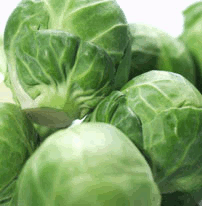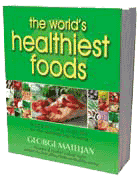


How the healthy fats in nuts help protect against cardiovascular disease
A Serving of Nuts Won't Make You Fat
Yes, it's true that nuts and seeds do contain a lot of fat and therefore calories. But, eaten in small quantities-a serving is just two to four tablespoons-these highly nutritious members of the World's Healthiest Foods deliver not only delicious flavor, but also nutritional benefits that can help protect you against cardiovascular disease. A handful of almonds, sunflower seeds or walnuts, eaten as a healthy snack or used as a flavorful addition to a tossed green salad, will not make you fat. Too many bowls full of salty nuts washed down with several beers may.
Nuts' Healthy Fats
Not only will reasonable amounts of nuts and seeds not make you fat, but the fat found in nuts and seeds is the primary reason eating them promotes a healthy heart. The fat nuts and seeds contain is mostly polyunsaturated, although they also contain a little monounsaturated, and a very small amount of saturated fat. The proper balance between these types of fats is important, and many people do not get enough of certain types, especially one type of polyunsaturated fat called omega-3. Nuts and seeds are rich sources of a type of omega 3 fat called alpha-linolenic acid (ALA), which belongs to the same family of omega 3 fats as the heart-healthy fats you may have heard about in cold water fish.
The omega-3 fatty acids found in nuts and seeds may help prevent heart disease and repeat heart attacks in several ways. Omega-3 fatty acids, including ALA, EPA and DHA are protective fats that have been found to:
- Lower blood cholesterol and triglyceride levels (when elevated, these are both risk factors for heart disease).
- Decrease platelet aggregation, which, when excessive, can cause "sticky" blood. Like aspirin, omega 3s "thin" the blood. The blood doesn't actually become thinner; but the red blood cells no longer clump together, so the blood flows more freely through the blood vessels, which is especially helpful in vessels that may be partially clogged with cholesterol build-up. If the blood is "sticky", clumps of red blood cells may form a clot that blocks a narrowed artery, triggering a heart attack if the blood vessel feeds the heart, or a stroke if the blood vessel is in the brain.
- Reduce the formation of artery-clogging atherosclerotic plaque. Once platelets aggregate or stick together, they release a substance that contributes to the process through which cholesterol is used to form atherosclerotic plaque. When atherosclerotic plaque builds up in the blood vessels, blood flow is decreased to a minimum or stopped all together, precipitating a heart attack or stroke. By reducing platelet aggregation, omega 3s may help short-circuit this whole process.
- Reduce inflammation of the blood vessels. If blood vessels are inflamed, or swollen, blood flow is reduced. Omega 3s are used within the body to produce anti-inflammatory chemical messengers called the Series E3 prostaglandins, which by lessening blood vessel inflammation, improve blood flow.
- Lower blood pressure, another a major risk factor for heart attacks and strokes. All the ways in which omega 3 fats promote blood vessel health contribute to maintenance of clear open vessels through which blood flows easily.
More Healthy Reasons to Eat Nuts
Nuts are a good source of plant protein, which is needed not only to build and maintain all body tissues, but for a healthy immune system as well. A handful of nuts or seeds will also provide you with fiber. The fiber in nuts and seeds not only helps keep your digestive tract, specifically your colon, in good health, but also promotes the health of your blood vessels since the soluble portion of nuts' fiber helps lower blood cholesterol-another boon to heart health.
As part of a healthy way of eating, nuts may even help those who wish to, to lose weight. The combination of protein, fiber and healthy fats provided by nuts and seeds helps keep blood sugar levels stable, which helps keep us from getting hungry too soon after eating.
In addition to the cardio-protective fats, plant protein and dietary fiber nuts provide, new research indicates that nuts are good sources of other bioactive molecules that support cardiovascular health. These include plant sterols, antioxidant phenolics, and numerous other phytochemicals-natural substances in plants that are beneficial to our health--that may be protective against chronic diseases.
Many phytochemicals act as powerful antioxidants. Antioxidants improve cardiovascular health because they destroy free radicals that can harm the lining of the blood vessels. Tiny micro-injuries in the lining of the vessel are a precursor to plaque development, which can eventually clog the artery. Yet another cardio-protective effect from a few nuts and seeds!
In recent studies, when nuts were incorporated into some of the subjects' test diets, their cholesterol levels dropped 25% more than researchers had predicted on the basis of nuts' heart-healthy fats. These very promising results suggest that nuts' other constituents also have significant cholesterol-lowering effects.
How to Maximize Nuts' and Seeds' Heart-healthy Benefits
To reap the benefits of nuts' omega-3 fatty acids, choose and store them carefully.
- Heat, air and light damage nuts' and seeds' fragile omega-3 fatty acids, and rancidity sets in long before you can taste or smell the "off" flavor, so it's important to buy nuts and seeds as fresh as possible.
- Buy nuts in their shell if you can, as the shell protects them from these environmental "hazards." If that is not possible, purchase them in vacuum sealed opaque packaging that protects them from air and light.
- If you buy nuts and seeds in bulk, go to a busy store that has a high turnover rate, so the nuts you bring home will not have been sitting in the bins for too long-exposed to room temperature, air and light. Some natural food stores keep their nuts in a refrigerated section, which is an ideal way to protect their omega 3 fat.
- After purchasing, do not let your nuts sit in a hot car and when you get them home, store in airtight containers in the refrigerator or freezer and enjoy them raw or lightly roasted at 160-170 degrees Fahrenheit for 15-20 minutes (roasting at higher temperatures causes damage to nuts' delicate omega 3 fats).
- Avoid nuts that are overly salted or have been roasted using oil. The damaged fats and high sodium content of these processed nuts may harm, not help, your heart.
| Some of the Nutrients in the World's Healthiest Nuts and Seeds* | ||||
|---|---|---|---|---|
| Nut or Seed | Omega 3 Fatty Acid Content (in grams) | Protein (in grams> | Fiber (in grams) | Calories (in kcals) |
| Almonds (1 ounce = 24 whole kernels) | 0.000 | 6.0 | 3.4 | 164 |
| Cashews, dry roasted, no salt (1 ounce = 18 kernels) | 0.190 | 4.3 | 0.9 | 163 |
| Flaxseeds (1 tablespoon) | 2.175 | 2.3 | 3.4 | 59 |
| Peanuts, dry roasted, no salt (1 ounce) | 0.001 | 6.7 | 2.3 | 166 |
| Pumpkin seeds, dried (1 ounce = 142 seeds) | 0.051 | 6.9 | 1.1 | 153 |
| Sesame seeds, dried (1 tablespoon) | 0.034 | 1.6 | 1.1 | 52 |
| Sunflower kernel seeds, dry roasted (1 ounce) | 0.020 | 5.5 | 3.1 | 166 |
| Walnuts, English, 1 ounce (14 halves) | 2.574 | 4.3 | 1.9 | 185 |
*The optimal amount of omega-3 fat to consume each day has not been determined, but in general it is recommended that people eat 1 gram or more per day.
Source: USDA National Nutrient Database for Standard Reference 2002.
References:
Kris-Etherton PM, Yu-Poth S, Sabate J, Ratcliffe HE, Zhao G, Etherton TD. Nuts and their bioactive constituents: effects on serum lipids and other factors that affect disease risk. Am J Clin Nutr1999 Sep;70(3 Suppl):504S-511S.
Bruce B, Spiller GA, Klevay LM, Gallagher SK. A diet high in whole and unrefined foods favorably alters lipids, antioxidant defenses, and colon function. J Am Coll Nutr 2000 Feb;19(1):61-7.
Macademia nuts URL: http://www.coopersnuthouse.com/maclib/ Effect Of Drying Temperature On Chemical Composition and Quality of Macadamia Nuts%20.htm
Pistachio nuts URL:
http://www.engr.usask.ca/dept/age/asae-csae/papers/asaepapermbsk02-213.pdf



